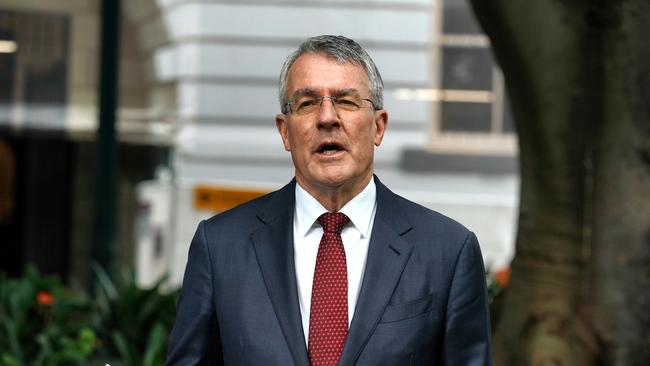Labor tips scales in favour of plaintiffs and their lawyers with sexual harassment bill
The Australian Labor Party sure knows how to wish its friends a happy new year.

Labor’s Attorney-General has introduced a bill giving employees who claim their employers have sexually harassed or discriminated against them a free pass to trot off to court. Under Dreyfus’s proposed bill, claimants who lose in court won’t have to pay their bosses’ legal bills unless the claim is so ridiculous that a judge labels it vexatious. And judges are not known for spotting even the most obvious vexatious claims.
Opposition legal affairs spokeswoman Michaelia Cash rightly points out that this straps a rocket booster to the litigation industry. The ALP’s old friends at firms such as Maurice Blackburn and Slater & Gordon will be licking their lips with new year glee. No more worries about meeting budgets or winning cases – if your billings are down, just find a claimant who has even the slightest sniff of a claim and bingo, billings are up.
Employers who thought the cult of disgruntled employees demanding “go away” money had at least arrived at a plateau will realise it is about to hit the sunlit uplands of litigation nirvana.
It’s not uncommon – indeed, it’s almost standard operating procedure – for employers to face fake claims of workplace harassment from an underperforming employee. It’s bad enough for big business, but what about small businesses or not-for-profits such as religious schools? They have little choice but to pay even a bogus claim as soon as it arrives in the inbox for fear of mountainous legal bills.
There are at least two rich veins of ALP policy history being mined here. The first is that old standby of Labor folklore – cash for policy. The second is a slighter newer tradition of trashing the legal fundamentals underlying the rule of law.
Cash for policy is the core of the ALP business model and works at many levels. We saw it in full swing from the outset of the Albanese government when Assistant Treasurer and Financial Services Minister Stephen Jones tried to sneak through regulations that would have concealed the amounts of money industry super funds paid to the unions.
The biggest policy thankyou to the unions that fund the ALP came in the form of industrial relations reforms such as redefining casual employment to the edge of extinction, the “same job, same pay” laws that aimed to gut the use of labour hire by BHP and Qantas and vastly increased powers and privileges for union delegates.
The Albanese government said an early thankyou to plaintiff law firms when, soon after being elected, it relaxed the rules governing litigation funding. Happily for class action law firms, Jones, early in his tenure, released litigation funders from the need to hold financial services licences. Prominent donors to the ALP such as Maurice Blackburn would no doubt have been suitably grateful.
Now comes this further boon to plaintiffs and their lawyers. It will indeed be a happy new year for them.
In some respects, the second trend is more worrying. In Australia, the usual expectation is that “costs follow the event”. In other words, the loser pays the winner’s costs. This rule creates in-built sanctions against bringing unworthy actions, offering society at least some protection from bottom-feeding lawyers.
Abolishing this rule, even in limited ways, guarantees that more disgruntled employees will try their luck at litigation lotto. Worse, the proposal to protect complainants against costs orders is evidence of something more – an increased desire by the Labor government to place a finger on the scales of justice to tilt them against unpopular defendants.
This government regards all employers with suspicion. Whether you are a family running a small business or BHP, this government wants to multiply claims against you as an instrument of policy.
BHP may be able to afford it – indeed, BHP’s army of lawyers, HR people and compliance officers will rejoice at the chance to engage in more empire building to deal with these rotten measures. BHP’s boneheaded embrace of the Albanese government is already coming back to bite it, but it is protected from the consequences of its board’s folly by the undeserved but seemingly endless rise of the iron ore price.
Small businesses do not have the buffer of such dumb luck. They already have to take a deep breath before hiring new staff, knowing what paperwork burdens await them, and will now have another category of claims and claimants to worry about. How does this help productivity – except at law firms?
The constant drip of measures reversing the onus of proof, measures making life tough for unpopular classes of defendant and measures encouraging speculative claims undermines confidence in our legal system.
When NSW judge Robert Newlinds recently called for an end to the “lazy and perhaps politically expedient” referral of baseless rape claims to courts, he touched a nerve already exposed by similar claims.

In August this year I wrote about the demonstrably false claims of domestic violence brought against boxer Harry Garside. Except that Garside had the good fortune, or foresight, to record a critical interaction with his accuser, this decent and somewhat quirky young man would have lost a promising career to a claim totally lacking in merit. Making it easier to launch legal actions is no guarantee of justice – indeed, the opposite may be true.
Dreyfus may argue, though he tabled no empirical evidence in support of this view, that measures to turbocharge claims of harassment and discrimination may help a claimant who would not otherwise get legal assistance.
Mind you, even Kate Jenkins, on whose Respect@Work report the Dreyfus proposal was based, did not go as far as the Dreyfus proposal. Jenkins recommended a hard cost-neutrality approach in line with the Fair Work Act where parties bear their own costs unless the claim was vexatious or unreasonable.
Given the voracious appetite of lawyers and litigation funders to find and run new claims on a no-win, no-fee basis, or similar, this now familiar Dreyfus overreach is even more dubious. There is no justice in turbocharging an inevitable torrent of “pay me to go away” claims and adding another Labor brake on productivity.
Centuries of legal experience have told us the right balance is to allow costs to follow the result. The Albanese government’s desire to ring in the new year by giving presents to its friends is no reason to ignore the wisdom of the ages.
Dreyfus’s ill-conceived changes are also a thankyou to big Australian companies and their boards for being stupid, for keeping their head down and thinking Labor wouldn’t come for them.
What fools these highly paid executives and board directors were – and are. Almost all of them signed on to Albanese’s signature policy of a constitutionally entrenched voice even before there was any wording around it. For months and months they flaunted their faux virtue over a policy that would not help them or their shareholders one iota – a policy that was overwhelmingly rejected at the referendum because ordinary Australians understood what was at stake. This stand of corporate Australia was the biggest single act of collective corporate negligence in many, many years.
It was made much worse by the fact that concurrently these same big companies ignored the larger and more real risk of Labor’s workplace policies being legislated with the help of the corporate-hating Greens – polices that directly hurt companies, big and small. Their negligence is economy destroying. And their public whinging now about Labor policies should be greeted by Peter Dutton with a cold shoulder.
The Opposition Leader should fashion himself as the saviour of small business and leave those people on big corporate boards to live with the consequences of misusing their power.







The Australian Labor Party sure knows how to wish its friends a happy new year. If there were any doubt about Mark Dreyfus’s place in the plaintiff lawyers’ Hall of Fame, his latest gift to them puts it to rest.